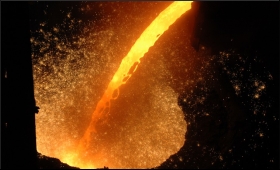|

|
'SAIL-ArcelorMittal JV deal likely to be clinched next month'
|
|

|
|
| Top Stories |
 |
|
|
|
SME Times News Bureau | 26 Jun, 2017
All hurdles in the formation of a joint venture (JV) between steel giants SAIL and ArcelorMittal have been removed and the final agreement may be signed next month, said Union Steel Minister Chaudhury Birendra Singh.
"A feasibility report on the new JV has been prepared and all the pre-requisites formalities have been achieved. The final draft of the agreement is ready and it may be signed as early as next month," Singh told IANS in an email interview.
More than two years ago, both the steel majors entered into a pact to explore the possibility to setup a Rs 5,000 crore JV to produce automotive steel. However, financial negotiations delayed the formation of the proposed project.
According to Singh, the JV will not only support the booming automobile sector in India but also provide specialised technologies to the state-run SAIL.
On the sector's debt burden, Singh highlighted that remedial measures like imposition of anti-dumping duty coupled with RBI's schemes have helped restructure some of the industry's stressed loans.
"Various trade remedial measures, like anti-dumping, safeguard measures, coupled with RBI schemes to restructure outstanding debts (have helped)," he said.
"These steps have helped improve the price realisations of the steel companies and are addressing the issue of NPAs of the steel sector gradually," he added.
Consumption-wise, Singh observed that the government's monetary and policy push to develop the infrastructure sector will raise the overall steel usage in the country.
Singh's optimism stems from the fact that a massive Rs 4 lakh crore has been allocated for infra creation for sectors such as railways, shipping and national highways in the Union Budget 2017-18.
In the last fiscal, the total finished steel consumption in the country rose by three per cent to 83.93 million tonnes in the last fiscal from 81.52 mt in 2015-16.
Singh pointed out that exports can effectively generate more demand. India shipped out 102.1 per cent more steel last fiscal at 8.24 million tonnes (mt), as compared to 4.07 mt in 2015-16.
"For developing export oriented units, MSMEs need to be encouraged to develop coast-based steel hubs within the coastal economic zones identified under Sagarmala Program," the minister said.
Export promotion is also expected to give a boost to domestic production. Currently, India is the world's third largest steel producer after China and Japan.
The domestic production grew by 11 per cent in 2016-17 to 101.27 mt.
"As per the short range outlook... the finished steel production is forecast to grow at 6.1 per cent for the calendar year 2017 and 7.1 per cent for 2018," Singh said.
To further lessen the financial load of the sector, Singh said that new strategies would be devised to extract coking coal domestically, so as to reduce the raw material cost burden on the steel industry.
"We are also going to revisit strategies for extraction of idle coking coal reserves in Jharia region," Singh said. The region is located in the mineral rich state of Jharkhand.
Currently, domestic steel producers import a majority of their coking coal requirements, thus incurring a massive expenditure estimated to be over Rs 10,000 crore per annum.
Recent industry data showed an upswing in international coking coal prices by about 100 per cent to more than $300 a tonne in April 2017.
The import dependence on the key raw material makes India's steel exports more expensive and is a major hindrance in government's plans to promote the industry.
Singh said that other "necessary steps" would be taken in conjunction with the Coal Ministry to expedite installation of coal washeries to ensure availability of low ash content coking coal to the sector.
"To reduce the country's import dependence, necessary steps will be taken to expedite installation of coal washeries, auction of coal to private sector for long term, thus encouraging investment in washeries and guaranteed long-term security in the linkage auction," Singh explained.
Coal washeries assume significance, as a major chunk of the black gold mined in the country is of thermal grade. However, if processed further, nearly 20 per cent of it can be converted into coking coal.
|
|
|
| |
|
|
|
|
|
|
|
|
|
|
|
|
|
|
| |
| Customs Exchange Rates |
| Currency |
Import |
Export |
US Dollar
|
66.20
|
64.50 |
UK Pound
|
87.50
|
84.65 |
Euro
|
78.25
|
75.65 |
| Japanese
Yen |
58.85 |
56.85 |
| As on 13 Aug, 2022 |
|
|
| Daily Poll |
 |
 |
| PM Modi's recent US visit to redefine India-US bilateral relations |
|
|
|
|
|
| Commented Stories |
 |
|
|
|
|
|
| |
|